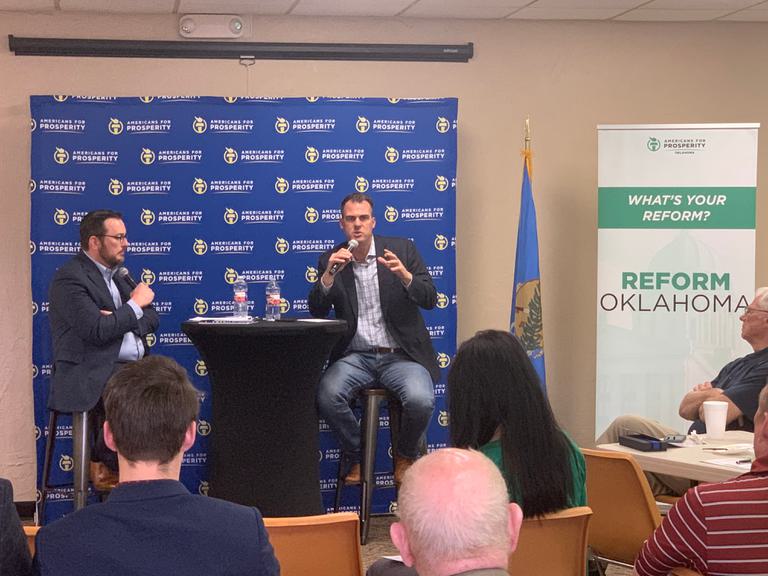
Health Care
Stitt discusses details, timeline for his Medicaid reform plan
Ray Carter | April 29, 2019
At a recent town hall meeting in Kingfisher, Gov. Kevin Stitt reiterated his opposition to a ballot initiative that would expand Oklahoma’s Medicaid program and said he plans to offer an alternative in the summer.
“My goal is to get that ready by August 31 so I can come back to Oklahomans and say, ‘Here is a plan,’” Stitt said. “There’s 49 other states that we can look at on their health outcomes, what’s working, how their rural hospitals are working.”
Under the traditional Medicaid program, states receive roughly 60 cents in federal money for every 40 cents provided in state funding to give government health coverage to very low-income and disabled individuals. But under the federal Affordable Care Act, better known as Obamacare, states receive a 90-10 match to cover able-bodied adults who earn too much to qualify for the current program. So far, Oklahoma lawmakers have declined to expand the program due to concerns regarding its cost and effectiveness.
It is estimated Medicaid expansion could add 628,000 able-bodied adults to state welfare rolls and cost Oklahoma taxpayers up to $374 million annually.
Activists have filed the paperwork to begin an initiative petition process that would put Medicaid expansion on the ballot and make it a constitutional right. In his State of the State address in February, Stitt voiced concern about over-reliance on federal funding that could be taken away, noting the state is already making up for the loss of federal funding in this year’s budget. And he has previously voiced opposition to the initiative-petition effort, a stance he reiterated in Kingfisher.
“I understand why Medicaid expansion is good for some folks,” Stitt said. “It’s great for providers, hospitals, that kind of stuff. But what does it do to taxpayers? And what is the unintended consequence that’s going to hit our state five years from now?”
He noted expansion would shift Medicaid from being a program that primarily serves the blind, disabled, low-income pregnant women, and children to a program that also serves a large population of able-bodied adults with no physical challenges. The state already struggles to cover the associated cost of the existing program.
“We already take care of a big population,” Stitt said. “There’s 850,000 people on our rolls today. I’ve asked for an audit of those rolls to make sure the right people are on there. I’m questioning if we have too many people abusing the system that shouldn’t be on there.”
However, Stitt said Republicans need to do more than oppose the initiative petition, and offered some insight into the plan he hopes to unveil at the end of summer.
Those who support Medicaid expansion often say it is needed to address the financial struggles of rural hospitals, but critics have noted the majority of Medicaid-expansion funding would actually go to urban hospitals whose financial trajectories appear far more secure.
Stitt suggested any reform plan should account for the different reality facing rural health care and urban health care.
“Other states actually do higher reimbursement rates for our rural communities,” Stitt said. “So that’s something I’m looking at. The big hospitals in the metro don’t want that, right? They want the reimbursement rates to be the same. But deliveries here in rural Oklahoma sometimes can be higher cost, and so that’s something we should look at as a state.”
He also said addressing the shortage of physicians in rural communities would be a goal.
“Getting providers to rural Oklahoma is a priority of mine with residency programs in rural areas,” Stitt said.
He noted most doctors establish their practice within 150 miles of where they went through a residency program.
Stitt said he is also reassessing the fee-for-service model now used in Medicaid.
“It doesn’t matter about the outcomes. It’s just they pay every single time there’s a service done,” Stitt said. “It’s a fee for service, versus other states are doing fees for outcomes. So there’s a lot of things that we can look at.”
Stitt’s comments were made in Kingfisher at an Americans for Prosperity-Oklahoma “Reform Oklahoma” town hall held on April 26.

Ray Carter
Director, Center for Independent Journalism
Ray Carter is the director of OCPA’s Center for Independent Journalism. He has two decades of experience in journalism and communications. He previously served as senior Capitol reporter for The Journal Record, media director for the Oklahoma House of Representatives, and chief editorial writer at The Oklahoman. As a reporter for The Journal Record, Carter received 12 Carl Rogan Awards in four years—including awards for investigative reporting, general news reporting, feature writing, spot news reporting, business reporting, and sports reporting. While at The Oklahoman, he was the recipient of several awards, including first place in the editorial writing category of the Associated Press/Oklahoma News Executives Carl Rogan Memorial News Excellence Competition for an editorial on the history of racism in the Oklahoma legislature.